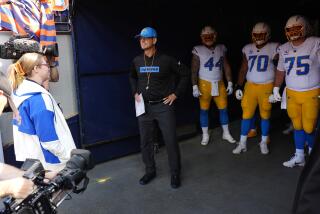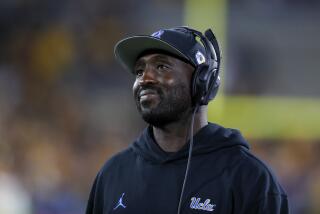A life coach for every need
- Share via
If you want to plant a garden, cook what you grow, find a husband, be a better husband, get a baby to sleep, get along with a teenager, get that teenager into college, get a divorce or lose 20 pounds, you don’t have to go it alone. There’s a coach to help you find your way just about anywhere you’d like to go.
Muddling through on our own doesn’t seem to be much of an option today. The urge to do things perfectly — or as close as possible — and the fear that we’re not up to the task has opened the field of coaching in myriad subjects, from coaching high-level executives in time management to coaching parents about how to communicate with their nannies.
“I think it’s an offshoot of an evolved and specialized world. There are fewer generalists and more specialists in everything. You can find the person who is the best bathroom caulker instead of just finding a handyman,” said Evan Marc Katz, a dating coach in Los Angeles.
If you are not satisfied with any aspect of your life, type it into Google and a coach is there to help you, he said.
“We live in an age when there are experts everywhere,” said Ada Calhoun, whose recent book, “Instinctive Parenting,” tries to get parents to rely on themselves. “You want to trust that somebody else knows.”
And she understands the impulse: “Having a kid is just so overwhelming. They’re so vulnerable. People get really scared, and there’s an industry preying on their fears,” Calhoun said by phone from New York.
Insecure and ill-prepared parents — particularly those who live far from family — may be especially needy. They can hire coaches to help them give birth, breast-feed their babies, get them to sleep through the night, find the perfect preschool. Calhoun knows of a sleep coach who charges $1,000 a night.
To some extent, whatever our age, we just can’t help ourselves.
“I believe that as human beings, we have an innate desire for perfectionism,” said Michael Hyde, a professor at Wake Forest University and author of the new book, “Perfection: Coming to Terms With Being Human.”
The desire to get better “appeals to something that is so fundamental to who we are as creatures,” he said.
Sometimes that’s to be applauded: It would be nice if your surgeon is perfect on the day you’re getting a new hip. But that desire “can also turn rotten,” Hyde noted. “To the extent you want to have a perfect look as that has been defined by the culture, you might become anorexic or bulimic, and you might die.”
A world that can seem like it’s changing before our eyes also can fuel a desire for a coach.
A couple of generations ago, most people made three or four important decisions that guided their lives, said Giovanna D’Alessio, president of the International Coaching Federation and a coach for companies and individuals in Europe. Today’s complex world requires decisions all the time: Should I move? Where? Is it time for me to change jobs? What’s the best way to invest for retirement? Will my child thrive in his school? All these questions put people in unfamiliar territory, she said.
Katz sees a paradox of choice that leaves many people frustrated. “In today’s society there are more choices, but nobody’s happier,” he said. Too many choices often lead to discontent, he said.
Novices might hear the word “coach” and think football. But athletic coaches generally are in charge, setting the goals and the path to victory. With other sorts of coaches, it’s the client who sets the goals.
The International Coaching Federation said there are 16,000 coaches worldwide, hundreds of schools offering training, as well as an endless variety of subjects: health, relationship, spiritual, creativity, business, career, acting, sewing, gardening, dating, parenting, divorce.
Coaching isn’t therapy, D’Alessio said. It often is very practical, focusing on actions a person can take to reach goals. Unlike therapists, coaches don’t focus on the childhood experiences that might be the root of the way a person lives or feels.
There’s also a difference between getting help from a coach and getting help from family and friends, several coaches said. Loved ones might be influenced by the past and long-held expectations. “Their advice is based on their point of view,” D’Alessio said. You shouldn’t hear a coach say, “If I were you, I would blah-blah-blah,’” but you’ll hear that from a friend, she said.
Coaching relies on a set of skills that lay people also can use: active listening, asking powerful questions, communicating directly, said Vikki Brock, a business and personal coach since 1995 who wrote about the profession for her doctoral dissertation.
It emerged in part from the human potential movement, in which people who were functioning well wanted to do better, and from corporate leadership training programs, Brock said. The field grew as people moved away from families, churches and other supportive institutions and became more isolated from humans and more connected to the Internet, Brock and D’Alessio said.
The career coaching business is booming at the moment, as people lose their jobs or retire early and don’t know how to enter another profession — perhaps one that speaks to their soul more than to their bank account, Brock said from her office in Ventura.
The ICF has a credentialing process for coaches and a code of ethics. But anyone can put out a shingle saying they’re a coach. D’Alessio and others recommend that people interview several coaches before choosing one.
The cost of hiring a coach ranges widely, from less than $50 an hour to more than $200.
Coaching is a sign of the times, said Mike Taylor, an “old hippie” and master gardener who works as a garden coach in Camarillo.
“What’s happened to our family structure? I saw my grandmothers at least once a week. They passed along a lot of cultural lore,” he said.
The goal for a coach “is to give people the knowledge they need to be successful at what they want to do. And if we had a different society, we wouldn’t need a coach,” Taylor said. Your grandmother would fill that job.
It’s not just the desire for knowledge that motivates people to turn to coaches, however.
Dave Herz is the founder and president of Vive Inc., a company that coaches teenagers and their parents. He said he sees many families who turn to coaching because they feel isolated. He and the other coaches at Vive work to help families create a web of support and learn to reach out to one another.
“I think in our society, we’re striving and hungry for connections with individuals — a boss, a grandparent,” he said. “That is hard-wired in human beings.”
Lisa Shield, a dating and relationship coach in Los Angeles, has been at it for seven years. Some of her clients, she said, have been through therapy, have “figured out why they are the way they are, [but] they still haven’t gotten the success they want.”
And that’s a good place for a coach to come in, she said.
“They have dreams and goals and in the midst of their busy hectic overfilled lives, they need someone to help them put together a game plan. And then they need someone to hold them accountable” for following that plan, she said.
“This really is an amazing process,” Shield said. “People make radical changes through coaching. They transform their lives. And I think that’s why it’s growing.”



